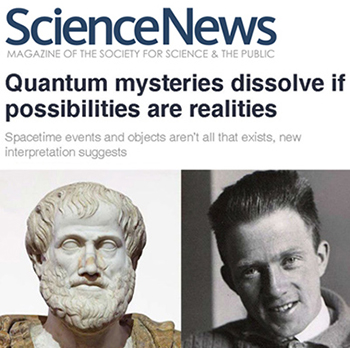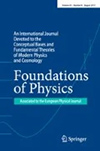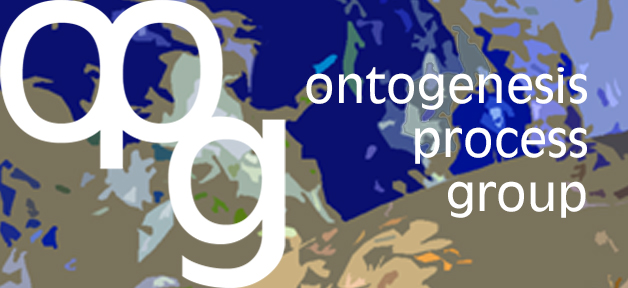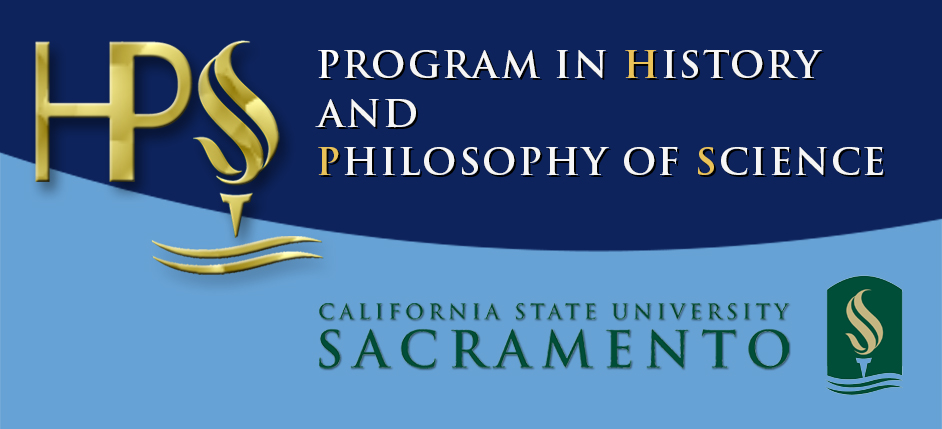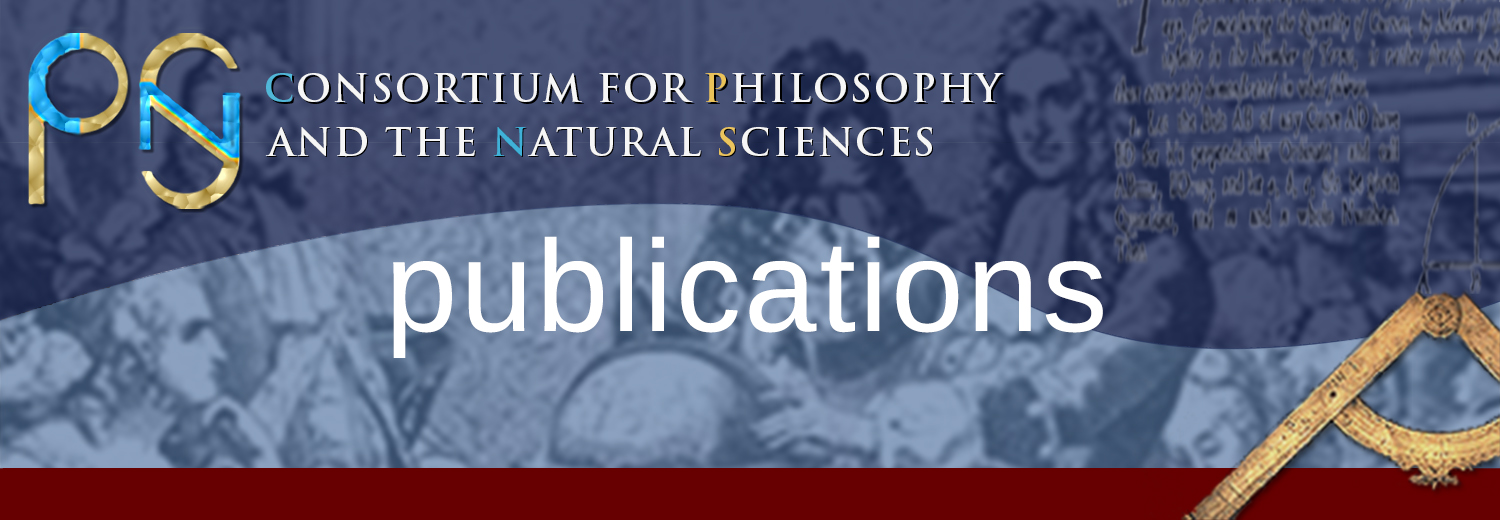
-
Quantum Mechanics and the Philosophy of Alfred North Whitehead
2nd ed. Fordham University Press, 2012
Michael Epperson
Research Professor
Founding Director and Principal Investigator
Consortium for Philosophy and the Natural Sciences
Director, History and Philosophy of Science Program
Department of History
California State University Sacramento
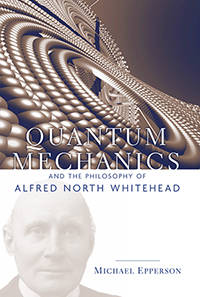
In Process and Reality and other works, Alfred North Whitehead struggled to come to terms with the impact the new science of quantum mechanics would have on his metaphysics. This ambitious book is the first extended analysis of the intricate relationships between quantum mechanics and Whitehead's philosophical cosmology.
Moving systematically--concept by concept, phase by phase--Michael Epperson illuminates the intersection of science and philosophy in Whitehead's work, and details Whitehead's attempt to fashion an ontology capable of coherently accommodating the current and future trajectory of modern physics.
But going far beyond this exploration, Epperson also makes important new contributions to the conceptualization of Whitehead's theory of quantum events ('actual occasions'), addressing the considerable attention paid by philosophers and other scholars to Nature's fundamentally quantum character as described by modern physics.
"Starting from recent interpretations of paradoxical experiments in quantum physics--such as those on nonlocality and decoherence--Michael Epperson has done a wonderful job of exploring in detail the remarkable parallels in Alfred North Whitehead's philosophical analysis of the transition from potentiality to actuality in elementary events."
IAN G. BARBOUR, Professor Emeritus of Science, Technology and Society, Carleton College
"Epperson has done a wonderful job in showing what one of the most detailed (and surely, one of the most difficult) metaphysical theories of the 20th century--Whitehead's philosophy of process--contributes to the ongoing debate about the proper ontological interpretation of quantum mechanics. Therefore, the book is highly recommended to anybody working on or being seriously interested in the ontology of quantum physics. Moreover, it is a "must read" for students of Whitehead's philosophy, since it will deepen their understanding of Whitehead's quite abstract scheme, to see quantum mechanics as a specific exemplification of some of the central structures of the philosophy of process."
FRANK HÄTTICH, Studies in History and Philosophy of Modern Physics
"Many of us in the ‘process’ community have felt a general congruity between Whitehead’s cosmology and quantum theory, even though the latter may have directly affected Whitehead's conceptuality only tangentially. We have been glad that in the past decade there has been growing interest among quantum theorists in Whitehead’s thought. We especially welcome this remarkable volume. It proposes a correlation of Whitehead's quite technical analysis of the phases of the concrescence of momentary occasions and the strange account of quantum events to which the evidence has driven physicists. At the very least, Michael Epperson has put forward ideas that warrant close attention and point fruitful directions for further inquiry. We may have here a still more successful work, which provides a definitive philosophical ground for quantum theory. In either case, this is an important, as well as a brilliant, book."
JOHN B. COBB, JR., Founding Co-Director, Center for Process Studies, Claremont Graduate University
"Coming at a time when interest in correlating physics and Whitehead’s philosophy has been expanding exponentially, the appearance of Epperson’s book is an event of first importance. Employing the decoherence-based interpretation of quantum mechanics, Epperson shows that it can be correlated rather precisely with Whitehead’s notion of ‘concrescence.’ Besides thereby showing how Whitehead’s philosophy brings out the ontological significance of quantum mechanics, Epperson also demonstrates that students of Whitehead’s philosophy will understand it better by seeing quantum mechanics as a specific exemplification of its general principles."
DAVID RAY GRIFFIN, Founding Co-Director, Center for Process Studies, Claremont Graduate University
-
Foundations of Relational Realism: A Topological Approach to Quantum Mechanics and the Philosophy of Nature
Lexington Books / Rowman & Littlefield, 2013
Michael Epperson
Research Professor
Founding Director and Principal Investigator
Consortium for Philosophy and the Natural Sciences
Director, History and Philosophy of Science Program
Department of History
California State University SacramentoElias Zafiris
Senior Research Fellow
Theoretical and Mathematical Physics
Institute of Mathematics
University of Athens, GreeceSenior Research Fellow
Consortium for Philosophy and the Natural Sciences
College of Natural Sciences and Mathematics
California State University, Sacramento
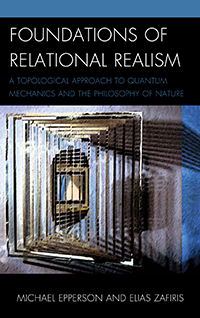
Among the many exotic interpretations of quantum theory—those entailing ‘multiverse’ cosmologies, 'time reversal,' ‘retro-causality,’ and physical superpositions of alternative actual system states—lies a single core principle: That quantum theory’s most emblematic feature is its invalidation of classical logic—the very foundation of intuitive, critical reasoning—at the level of fundamental physics. As a result, quantum mechanics has become widely popularized, and in many cases, marketed, as mystifying and essentially incomprehensible to non-specialists.
Yet at the heart of this popularization lies a paradox: The rules of classical logic purportedly invalidated by quantum mechanics are, at the same time, necessarily presupposed by quantum mechanics; indeed, they are the very rules used to formalize quantum mechanics in the first place.
In Foundations of Relational Realism: A Topological Approach to Quantum Mechanics and the Philosophy of Nature (Rowman & Littlefield, 2013), Michael Epperson and Elias Zafiris provide a powerful new solution to this paradox by upgrading quantum theory’s presupposed set theoretic, metrical structure, grounded in object elements, to a category theoretic, topological structure grounded in object relations. To this end, the book presents a novel, intuitive interpretation of quantum mechanics, based on a revised decoherent histories interpretation, structured within a category theoretic topological formalism.
In this unique two-part volume, designed to be comprehensible to both specialists and non-specialists, the authors chart out a pathway forward by identifying the central deficiency in most interpretations of quantum mechanics, and indeed, in modern philosophy more generally: That in the conventional, metrical depiction of extension, inherited from the Enlightenment, objects are characterized as fundamental to relations—i.e., such that relations presuppose objects but objects do not presuppose relations. The authors, by contrast, argue that in quantum mechanics physical extensiveness fundamentally entails not only relations of objects, but also relations of relations. In this way, quantum mechanics exemplifies a concept of extensive connection that it is fundamentally topological rather than metrical, and thus requires a logico-mathematical framework grounded in category theory rather than set theory.
By this thesis, the fundamental quanta of quantum physics are properly defined as units of logico-physical relation rather than merely units of physical relata as is the current convention. Objects are always understood as relata, and likewise relations are always understood objectively. Objects and relations are thus coherently defined as mutually implicative. The conventional notion of a history as ‘a story about fundamental objects’ is thereby reversed, such that the classical ‘objects’ become the story by which we understand physical systems that are fundamentally histories of quantum events. These are just a few of the novel critical claims explored in this volume—claims whose exemplification in quantum mechanics will, the authors argue, serve more broadly as foundational principles for the philosophy of nature as it evolves through the 21st century and beyond.
"A startling development in the last century has been the overflowing of theoretical and observational sciences into the fields of philosophy, particularly by quantum mechanics and cosmology. The present book is twice valuable on this fascinating subject in my opinion: on one hand for its clear and lucid exposition and application of Whitehead's ontology as a most attractive framework for this kind of query, and on the other hand, for its extension of the dialectics of ontology through an original use of advanced concepts from modern mathematics."
ROLAND OMNÈS, Professor Emeritus of Theoretical Physics at the University of Paris-Sud, author of The Interpretation of Quantum Mechanics and Converging Realities (both Princeton University Press).
"This is a unique book in its scope, approach and method. A novel physical and philosophical interpretation of sheaf theory sheds new light on the quantum measurement problem, entanglement, locality and truth. A new systematic and rigorous relational realistic paradigm for natural philosophy has emerged, rooted on the same principles with Abstract (Modern) Differential Geometry, that transmutes the above into a fully fledged dynamical theory."
ANASTASIOS MALLIOS, Professor Emeritus of Mathematics, Department of Mathematics, University of Athens, author of Geometry of Vector Sheaves (Springer) and Modern Differential Geometry in Gauge Theories (Birkhäuser).
“Recommended reading for graduate students and researchers/faculty. One of the driving contentions in modern physics has been the inability to reconcile the dominance of classical thought in the theory of relativity with the indeterminate nature of quantum mechanics. Some would argue that one such attempt at a compromise had arrived in the form of quantum field theories, with multiple ideas for resolving the asymmetrical features between relativity and ordinary quantum mechanics. Here, Epperson and Zafiris decide to return to ordinary quantum mechanics and propose sheaf theory, a theory that grew out of the abstract algebra of topology and set theory, as a solution to the stubborn paradoxes found in quantization attempts. They then compare the theory's interpretive value to the category scheme found in Whitehead's Process and Reality (1929). Epperson's earlier work, Quantum Mechanics and the Philosophy of Alfred North Whitehead (2004), is a good predecessor to the current book.”
CHOICE (March 2014)
-
Differential Sheaves and Connections: A Natural Approach to Physical Geometry
World Scientific, 2015
Anastasios Mallios
Professor of Mathematics
University of Athens, Greece
Elias Zafiris
Senior Research Fellow in Theoretical and Mathematical Physics
Institute of Mathematics
University of Athens, Greece
Senior Research Fellow
Consortium for Philosophy and the Natural Sciences
College of Natural Sciences and Mathematics
California State University, Sacramento
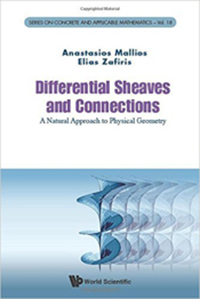
This unique book provides a self-contained conceptual and technical introduction to the theory of differential sheaves. This serves both the newcomer and the experienced researcher in undertaking a background-independent, natural and relational approach to "physical geometry". In this manner, this book is situated at the crossroads between the foundations of mathematical analysis with a view toward differential geometry and the foundations of theoretical physics with a view toward quantum mechanics and quantum gravity. The unifying thread is provided by the theory of adjoint functors in category theory and the elucidation of the concepts of sheaf theory and homological algebra in relation to the description and analysis of dynamically constituted physical geometric spectrums.
-
Physics and Speculative Philosophy: Potentiality in Modern Science
De Gruyter, Berlin / New York (March, 2016)
Timothy E. Eastman
NASA Goddard / Plasmas International
Michael Epperson
Research Professor
Founding Director and Principal Investigator
Consortium for Philosophy and the Natural Sciences
Director, History and Philosophy of Science Program
Department of History
California State University Sacramento
David Ray Griffin
Professor Emeritus
Claremont Graduate University
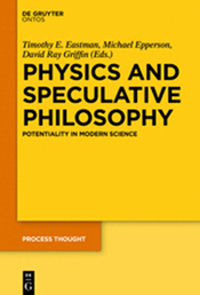
Through both an historical and philosophical analysis of the concept of possibility, we show how including both potentiality and actuality as part of the real is both compatible with experience and contributes to solving key problems of fundamental process and emergence. The book is organized into four main sections that incorporate our routes to potentiality: (1) potentiality in modern science [history and philosophy; quantum physics and complexity]; (2) Relational Realism [ontological interpretation of quantum physics; philosophy and logic]; (3) Process Physics [ontological interpretation of relativity theory; physics and philosophy]; (4) on speculative philosophy and physics [limitations and approximations; process philosophy].
We conclude that certain fundamental problems in modern physics require complementary analyses of certain philosophical and metaphysical issues, and that such scholarship reveals intrinsic features and limits of determinism, potentiality and emergence that enable, among others, important progress on the quantum theory of measurement problem and new understandings of emergence.
-
Untying the Gordian Knot: Process, Reality, and Context
De Gruyter, Berlin / New York (March, 2016)
Timothy E. Eastman
NASA Goddard / Plasmas International
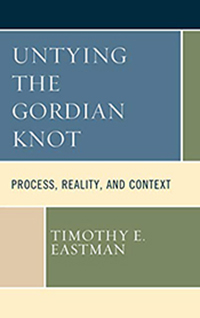
In Untying the Gordian Knot: Process, Reality, and Context, Timothy E. Eastman proposes a new creative synthesis, the Logoi framework—which is radically inclusive and incorporates both actuality and potentiality—to show how the fundamental notions of process, logic, and relations, woven with triads of input-output-context and quantum logical distinctions, can resolve a baker’s dozen of age-old philosophic problems. Further, Eastman leverages a century of advances in quantum physics and the Relational Realism interpretation pioneered by Michael Epperson and Elias Zafiris and augmented by the independent research of Ruth Kastner and Hans Primas to resolve long-standing issues in understanding quantum physics. Adding to this, Eastman makes use of advances in information and complex systems, semiotics, and process philosophy to show how multiple levels of context, combined with relations—including potential relations—both local and local-global, can provide a grounding for causation, emergence, and physical law. Finally, the Logoi framework goes beyond standard ways of knowing—that of context independence (science) and context focus (arts, humanities)—to demonstrate the inevitable role of ultimate context (meaning, spiritual dimension) as part of a transformative ecological vision, which is urgently needed in these times of human and environmental crises.
-
Quantum Relativity: A Synthesis of the Ideas of Einstein and Heisenberg
Berlin: Springer, 1996
David Ritz Finkelstein
Department of Physics
Georgia Institute of Technology
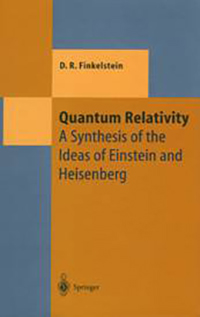
Over the past years, physicist David Finkelstein has developed a quantum language going beyond the concepts used by Bohr and Heisenberg. The simple formal algebraic language is designed to be consistent with quantum theory. It differs from natural languages in its epistemology, modal structure, logical connections, and copulatives.
Starting from ideas of John von Neumann and in part also as a response to his fundamental work, the author bases his approach on what one really observes when studying quantum processes. This way the new language can be seen as a clue to a deeper understanding of the concepts of quantum physics, at the same time avoiding those paradoxes which arise when using natural languages. The work is organized didactically: The reader learns in fairly concrete form about the language and its structure as well as about its use for physics.
-
Converging Realities: Toward a Common Philosophy of Physics and Mathematics
Princeton University Press, 2004
Roland Omnès
Department of Physics
University of Paris XI
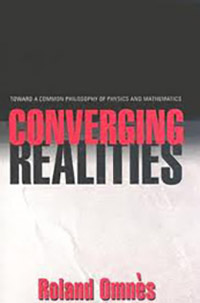
The mysterious beauty, harmony, and consistency of mathematics once caused philosopher Hilary Putnam to term its existence a "miracle." Now, advances in the understanding of physics suggest that the foundations of mathematics are encompassed by the laws of nature, an idea that sheds new light on both mathematics and physics.The philosophical relationship between mathematics and the natural sciences is the subject of Converging Realities, the latest work by one of the leading thinkers on the subject. Based on a simple but powerful idea, it shows that the axioms needed for the mathematics used in physics can also generate practically every field of contemporary pure mathematics. It also provides a foundation for current investigations in string theory and other areas of physics.
This approach to the nature of mathematics is not really new, but it became overshadowed by formalism near the end of the nineteenth century. The debate turned eventually into an exclusive dialogue between mathematicians and philosophers, as if physics and nature did not exist.
This unsatisfactory situation was enforced by the uncertain standing of physical reality in quantum mechanics. The recent advances in the interpretation of quantum mechanics (as described in Quantum Philosophy, also by Omnès) have now reconciled the foundations of physics with objectivity and common sense. In Converging Realities, Roland Omnès is amongthe first scholars to consider the connection of natural laws with mathematics.
-
Quantum Philosophy: Understanding and Interpreting Contemporary Science
Princeton University Press, 2002
Roland Omnès
Department of Physics
University of Paris XI
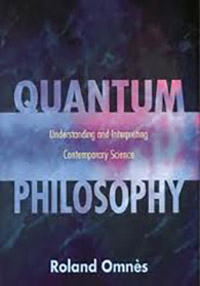
In this magisterial work, Roland Omnès takes us from the academies of ancient Greece to the laboratories of modern science as he seeks to do no less than rebuild the foundations of the philosophy of knowledge. One of the world's leading quantum physicists, Omnès reviews the history and recent development of mathematics, logic, and the physical sciences to show that current work in quantum theory offers new answers to questions that have puzzled philosophers for centuries: Is the world ultimately intelligible? Are all events caused? Do objects have definitive locations? Omnès addresses these profound questions with vigorous arguments and clear, colorful writing, aiming not just to advance scholarship but to enlighten readers with no background in science or philosophy.
The book opens with an insightful and sweeping account of the main developments in science and the philosophy of knowledge from the pre-Socratic era to the nineteenth century. Omnès then traces the emergence in modern thought of a fracture between our intuitive, commonsense views of the world and the abstract and--for most people--incomprehensible world portrayed by advanced physics, math, and logic. He argues that the fracture appeared because the insights of Einstein and Bohr, the logical advances of Frege, Russell, and Godel, and the necessary mathematics of infinity of Cantor and Hilbert cannot be fully expressed by words or images only. Quantum mechanics played an important role in this development, as it seemed to undermine intuitive notions of intelligibility, locality, and causality. However, Omnès argues that common sense and quantum mechanics are not as incompatible as many have thought. In fact, he makes the provocative argument that the "consistent-histories" approach to quantum mechanics, developed over the past fifteen years, places common sense (slightly reappraised and circumscribed) on a firm scientific and philosophical footing for the first time. In doing so, it provides what philosophers have sought through the ages: a sure foundation for human knowledge. Quantum Philosophy is a profound work of contemporary science and philosophy and an eloquent history of the long struggle to understand the nature of the world and of knowledge itself.
-
Understanding Quantum Mechanics
Princeton University Press, 1999
Roland Omnès
Department of Physics
University of Paris XI
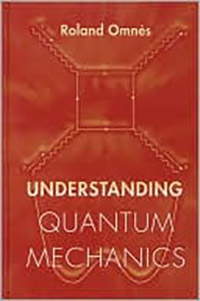
Here Roland Omnès offers a clear, up-to-date guide to the conceptual framework of quantum mechanics. In an area that has provoked much philosophical debate, Omnès has achieved high recognition for his Interpretation of Quantum Mechanics (Princeton 1994), a book for specialists. Now the author has transformed his own theory into a short and readable text that enables beginning students and experienced physicists, mathematicians, and philosophers to form a comprehensive picture of the field while learning about the most recent advances.
This new book presents a more streamlined version of the Copenhagen interpretation, showing its logical consistency and completeness. The problem of measurement is a major area of inquiry, with the author surveying its history from Planck to Heisenberg before describing the consistent-histories interpretation. He draws upon the most recent research on the decoherence effect (related to the modern resolution of the famous Schrdinger's cat problem) and an exact formulation of the correspondence between quantum and particle physics (implying a derivation of classical determinism from quantum probabilism).
Interpretation is organized with the help of a universal and sound language using so-called consistent histories. As a language and a method, it can now be shown to be free of ambiguity and it makes interpretation much clearer and closer to common sense.
-
The Interpretation of Quantum Mechanics
Princeton University Press, 1994
Roland Omnès
Department of Physics
University of Paris XI
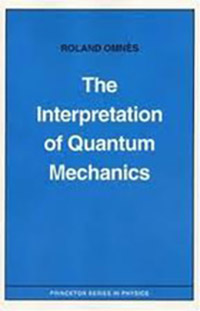
The interpretation of quantum mechanics has been controversial since the introduction of quantum theory in the 1920s. Although the Copenhagen interpretation is commonly accepted, its usual formulation suffers from some serious drawbacks. Based mainly on Bohr's concepts, the formulation assumes an independent and essential validity of classical concepts running in parallel with quantum ones, and leaves open the possibility of their ultimate conflict. In this book, Roland Omnès examines a number of recent advances, which, combined, lead to a consistent revision of the Copenhagen interpretation. His aim is to show how this interpretation can fit all present experiments, to weed out unnecessary or questionable assumptions, and to assess the domain of validity where the older statements apply. Drawing on the new contributions, The Interpretation of Quantum Mechanics offers a complete and self-contained treatment of interpretation (in nonrelativistic physics) in a manner accessible to both physicists and students. Although some "hard" results are included, the concepts and mathematical developments are maintained at an undergraduate level.
This book enables readers to check every step, apply the techniques to new problems, and make sure that no paradox or obscurity can arise in the theory. In the conclusion, the author discusses various philosophical implications pertinent to the study of quantum mechanics.
-
The Origins of Order: Self-Organization and Selection in Evolution
Oxford University Press, 1993
Stuart Kauffman
Professor Emeritus
Dept. of Biochemistry and Biophysics
University of Pennsylvania
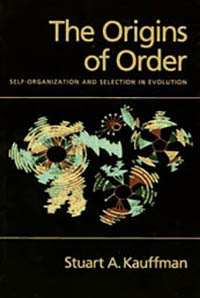
A major scientific revolution has begun, a new paradigm that rivals Darwin's theory in importance. At its heart is the discovery of the order that lies deep within the most complex of systems, from the origin of life, to the workings of giant corporations, to the rise and fall of great civilizations. And more than anyone else, this revolution is the work of one man, Stuart Kauffman, a MacArthur Fellow and visionary pioneer of the new science of complexity. Now, in At Home in the Universe, Kauffman brilliantly weaves together the excitement of intellectual discovery and a fertile mix of insights to give the general reader a fascinating look at this new science--and at the forces for order that lie at the edge of chaos. What we are now only discovering, Kauffman says, is that range of spontaneous order is enormously greater than we had supposed and, in fact, self-organization is a great undiscovered principle of nature.
-
Investigations
Oxford University Press, 2002
Stuart Kauffman
Professor Emeritus
Dept. of Biochemistry and Biophysics
University of Pennsylvania
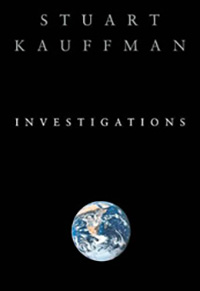
In the tradition of Schrodinger's classic What Is Life?, this book is a tour-de-force investigation of the basis of life itself, with conclusions that radically undermine the scientific approaches on which modern science rests-the approaches of Newton, Boltzman, Bohr, and Einstein. Kauffman's At Home in the Universe, which The New York Times Book Review called "passionately written" and Nature named "courageous," introduced pivotal ideas about order and evolution in complex life systems. In investigations, Kauffman builds on these theories and finds that classical science does not take into account that physical systems--such as people in a biosphere--affect their dynamic environments in addition to being affected by them. These systems act on their own behalf as autonomous agents, but what defines them as such? By defining and explaining autonomous agents and work in the contexts of thermodynamics and of information theory, Kauffman supplies a novel answer to this age-old question, laying out a foundation for a new concept of organization and emergent general biology.
-
Humanity in a Creative Universe
Oxford University Press, 2016
Stuart Kauffman
Professor Emeritus
Dept. of Biochemistry and Biophysics
University of Pennsylvania
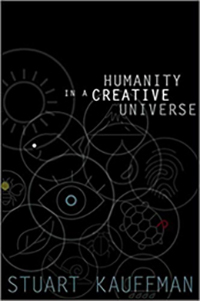
A recent Scientific American article claims that "philosophy begins where physics ends, and physics begins where philosophy ends," and perhaps no better quote sums up what Kauffman's latest book offers. Grounded in his rigorous training and research background, Kauffman is inter-disciplinary in every sense of the word, sorting through the major questions and theories in biology, physics, and philosophy. Best known for his philosophy of evolutionary biology, Kauffman coined the term "prestatability" to call into question whether science can ever accurately and precisely predict the future development of biological features in organisms. As evidenced by the title's mention of creativity, the book refreshingly argues that our preoccupation to explain all things with scientific law has deadened our creative natures. In this fascinating read, Kauffman concludes that the development of life on earth is not entirely predictable, because no theory could ever fully account for the limitless variations of evolution. Sure to cause a stir, this book will be discussed for years to come and may even set the tone for the next "great thinker."
-
A World Beyond Physics: The Emergence and Evolution of Life
Oxford University Press, 2019
Stuart Kauffman
Professor Emeritus
Dept. of Biochemistry and Biophysics
University of Pennsylvania
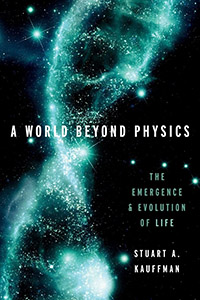
Is the evolution of life describable by any physics-like laws? Stuart Kauffman's latest book offers an explanation-beyond what the laws of physics can explain-of the progression from a complex chemical environment to molecular reproduction, metabolism and to early protocells, and further evolution to what we recognize as life. Among the estimated one hundred billion solar systems in the known universe, evolving life is surely abundant. That evolution is a process of "becoming" in each case. Since Newton, we have turned to physics to assess reality. But physics alone cannot tell us where we came from, how we arrived, and why our world has evolved past the point of unicellular organisms to an extremely complex biosphere.
Building on concepts from his work as a complex systems researcher at the Santa Fe Institute, Kauffman focuses in particular on the idea of cells constructing themselves and introduces concepts such as "constraint closure." Living systems are defined by the concept of "organization" which has not been focused on in enough in previous works. Cells are autopoetic systems that build themselves: they literally construct their own constraints on the release of energy into a few degrees of freedom that constitutes the very thermodynamic work by which they build their own self creating constraints. Living cells are "machines" that construct and assemble their own working parts. The emergence of such systems-the origin of life problem-was probably a spontaneous phase transition to self-reproduction in complex enough prebiotic systems. The resulting protocells were capable of Darwin's heritable variation, hence open-ended evolution by natural selection. Evolution propagates this burgeoning organization. Evolving living creatures, by existing, create new niches into which yet further new creatures can emerge. If life is abundant in the universe, this self-constructing, propagating, exploding diversity takes us beyond physics to biospheres everywhere.
-
Physics and Whitehead: Quantum, Process, and Experience
SUNY Press, 2003
Timothy E. Eastman (ed)
NASA Goddard / Plasmas International
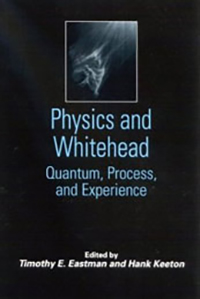
Featuring discussions and dialogue by prominent scientists and philosophers, this book explores the rich interface of contemporary physics and Whitehead-inspired process thought. The contributors share the conviction that quantum physics not only corroborates many of Whitehead's philosophical theses, but is also illuminated by them. Thus, though differing in perspective or emphasis, the contributions by Geoffrey Chew, David Finkelstein, Henry Stapp and other scientists conceptually dovetail with those of Philip Clayton, Jorge Nobo, Yutaka Tanaka and other process philosophers.
"Without question this book contains some outstanding and state-of-the-art essays on the very significant issue of the relation between Whitehead's philosophy and contemporary physics. This is a truly needed addition to the growing field of process studies."
GEORGE W. SHIELDS, editor of Process and Analysis:
Whitehead, Hartshorne, and the Analytic Tradition"What excites me most about this book is the effort of leading physicists to advance their reflections about physics through interaction with philosophy--primarily that of Whitehead. It also suggests that, after a long delay, cutting-edge scientists recognize the need of science for some of Whitehead's seminal ideas."
JOHN B. COBB, JR., Founding Co-director, Center for Process Studies
-
Mind, Matter and Quantum Mechanics
Springer, 2004
Henry P. Stapp
Lawrence Berkeley National Laboratory
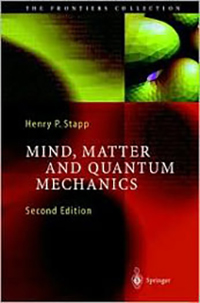
"Scientists other than quantum physicists often fail to comprehend the enormity of the conceptual change wrought by quantum theory in our basic conception of the nature of matter," writes Henry Stapp. Stapp is a leading quantum physicist who has given particularly careful thought to the implications of the theory that lies at the heart of modern physics.In this book, which contains several of his key papers as well as new material, he focuses on the problem of consciousness and explains how quantum mechanics allows causally effective conscious thought to be combined in a natural way with the physical brain made of neurons and atoms.
The book is divided into four sections. The first consists of an extended introduction. Key foundational and somewhat more technical papers are included in the second part, together with a clear exposition of the "orthodox" interpretation of quantum mechanics. The third part addresses, in a non-technical fashion, the implications of the theory for some of the most profound questions that mankind has contemplated: How does the world come to be just what it is and not something else?
How should humans view themselves in a quantum universe? What will be the impact on society of the revised scientific image of the nature of man? The final part contains a mathematical appendix for the specialist and a glossary of important terms and ideas for the interested layman. This new edition has been updated and extended to address recent debates about consciousness.
"The author develops new chapters on many findings of recent research on the mind-body problem as well as their extrapolation to new and difficult technical and social areas. The book is highly recommended to physicists, mathematicians, social scientists, and intelligent general readers." (Albert A. Mullin, Zentralblatt MATH, Vol. 1087, 2006)
-
Process and Analysis: Whitehead, Hartshorne, and the Analytic Tradition
SUNY Press, 2003
George Shields
Professor of Philosophy
Kentucky State University
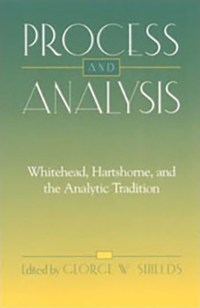
Process and Analysis brings together an unprecedented collection of the world’s leading contemporary process and analytic philosophers to explore philosophical topics of common interest. The contributors examine a wide variety of explicit and implicit commonalities and differences of approach to such central philosophical issues as the nature and status of events, time, space, relations, particulars, and God.
This unique collection demonstrates that both traditions have important things to say to one another. In fact, a largely ignored conversation between the two traditions has been carried on since at least the days of Whitehead’s influence on early Cambridge analytic philosophy. This long awaited volume is an invaluable research tool for scholars and students alike working in the areas of analytic and process philosophy.
-
Whitehead's Metaphysics of Extension and Solidarity
SUNY Press, 1986
Jorge Nobo
Professor of Philosophy
Washburn University
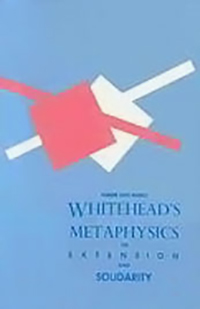
At the base of Whitehead's philosophy of organism is a vision of the solidarity of all final actualities. Each actuality is a discrete individual enjoying autonomous self-determination, yet each also requires all other actualities as essential components and partial determinants of its own nature. This vision of universal solidarity, Nobo demonstrates, is the fundamental metaphysical thesis whose truth the categories and principles of Whitehead's philosophy were expressly designed to elucidate. The received interpretations of Whitehead's thought, Nobo shows, have ignored the mutual relevance of the solidarity thesis and the organic categoreal scheme and, for that reason, have grossly misrepresented many of Whitehead's most important metaphysical doctrines.
Contending that the difficult tasks of interpreting and developing Whitehead's metaphysics presuppose an understanding of the solidarity thesis, Nobo explores that thesis and the metaphysical categories and principles most relevant to its elucidation. In the process, he not only corrects many misinterpretations but also develops important metaphysical doctrines that Whitehead neglected to make sufficiently explicit in his published writings.
It is precisely in terms of the neglected doctrine of eternal extensive continuity, Nobo demonstrates, that the more puzzling aspects of the solidarity thesis are satisfactorily explained. He then shows that the extensional solidarity of all final actualities is an essential ingredient of the generalized conception of experience on which Whitehead builds his ontology, cosmology, and epistemology.
-
Clifford Algebra: A Case for Geometric and Ontological Unificaiton
VDM Verlag, 2009
William Kallfelz
Professor of Philosophy
Mississippi State University
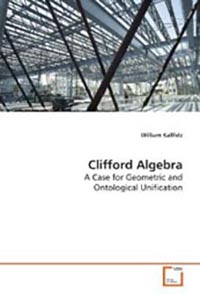
Robert Batterman's ontological insights are apt (nature indeed abhhors singularities), though his epistemic assessments are murky. For he writes that singularities play an essential role in certain classes of physical theories representing critical phenomena. I outline a procedure which makes essential use of Clifford Algebra to counter his claims. I use some of the demonstrated formal unity of Clifford Algebra to argue that Batterman appears to conflate a physical theory's ontology with its purely mathematical content. Carefully distinguishing the two, and employing Clifford Algebraic methods reveals a symmetry between explanation and reduction that Batterman overlooks. I refine this point by showing that the methods adopted in Clifford Algebraic computational fluid dynamics undercut many of Batterman's claims concerning the essentially explanatory role played by singularities. I also argue that the model of inter-theoretic reduction and explanation offered by Fritz Rohrlich and aspects of structuralism provide the best framework for accommodating the burgeoning research tradition of Clifford Algebra in the mathematical sciences.
